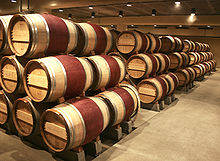Wine

|

|
| red and white wine | |
Wine is an alcoholic drink. It is made from the juice of grape.
If alcoholic drinks made from the juice of other fruits (such as plums or blackberries they may be called "wine". This article only deals with wine made from grapes.
Different types of wine
[change | change source]There are two main types of wine, red wine and white wine. Red wine is made using the skins of the grapes. The skins give the wine a dark color, and chemicals called tannins that taste slightly bitter. Red wine can be sweet or dry. "Dry" means low in sugar.
White wine is made without the grape skins at all, so it is usually less bitter and more acidic. Like red wines, they can be sweet or dry.
Rosé wine (a French word meaning "pink") is in between: it has some flavor and color from the skins, but not as much as a red wine.
Wine with bubbles in it, called sparkling wine. Sparkling wine can be red, white, or rosé, but is usually white. It can be made in any country, but the best-known sparkling wines are champagne, which comes from France and (recently) southern England, Prosecco, from Italy.
Fortified wine is made by mixing liquor into the wine while it ferments.
Wine making
[change | change source]
Wine making begins with growing red or white grapes. Wine grapes have thicker skins and bigger seeds compared to grapes for eating. After the grapes are ripe, they are picked off the plants. There are different ways of picking (for example, using machines, or picking by hand, in the day, or at night).
After harvest, the grapes are crushed to release their juice, which is very sugary. Before, this was done by people stomping on grapes with their bare feet. Today, machines are used, but people sometimes use their bare feet in festivals. The person making the wine also decides now if the wine will be red, white, or rose:

- If the grape skins sit in the juice a long time, the wine will be red.
- If the grape skins sit in the juice a short time, the wine will be rosé.
- If the grape skins do not sit in the juice at all, the wine will be white.
Next, the sweet grape juice is fermented, by adding yeast. In a few days, the yeast turns the sugar into alcohol, and also releases carbon dioxide.

After fermenting, the wine is stored for a while (called "aging"). The person making the wine can make different choices, which will change the flavor of the wine. They can choose to store the wine in a steel container, or a barrel made of oak wood. If they choose wood, the wine will absorb some of the wood flavor, which wine drinkers call "oakiness". This process can take only a couple of weeks, up to several years, depending on what kind of flavor the wine maker wants.
Lastly, the wine is bottled and sent to a customer, restaurant or store to be enjoyed.
Wine and people
[change | change source]People have been making wine for at least 5000 years. The oldest evidence of ancient wine production has been found in Georgia from c. 6000 BC (the earliest known traces of grape wine),[1][2]
Related pages
[change | change source]References
[change | change source]- ↑ "'World's oldest wine' found in 8,000-year-old jars in Georgia". BBC News. 13 November 2017. Retrieved 19 June 2020.
- ↑ McGovern; et al. (13 November 2017). "Early Neolithic wine of Georgia in the South Caucasus". Proceedings of the National Academy of Sciences. 114 (48). PNAS: E10309–E10318. Bibcode:2017PNAS..11410309M. doi:10.1073/pnas.1714728114. PMC 5715782. PMID 29133421.
{{cite journal}}: Explicit use of et al. in:|last1=(help)
